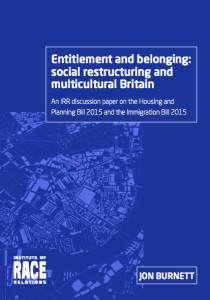IRR says legislation will see multicultural neighbourhoods increasingly broken up and displaced
The Institute of Race Relations (IRR) last week released a report which argues that the Housing and Planning Bill 2015 and the Immigration Bill 2015 will be destructive for social cohesion.
The report's author, Dr Jon Burnett, says that the legislation appears aimed at a rapid social restructuring and will see multicultural neighbourhoods increasingly broken up and displaced.
 You can read the report, Entitlement and belonging: social restructuring and multicultural Britain, here.
You can read the report, Entitlement and belonging: social restructuring and multicultural Britain, here.
Both the Housing and Planning Bill 2015 and the Immigration Bill 2015 are currently going through parliament. Burnett says both bills are central to a Government policy of societal and state restructuring, with the long-established ‘hostile environment' immigration policy being extended into housing.
Dr Burnett told IRR: "In rolling out the measures, the government risks rolling out discrimination. Equally concerning though is the ideological assumptions underpinning the legislation about 'who' belongs in particular localities. The poor in multicultural neighbourhoods are being dispossessed of their rights and uprooted from where they live. They have been deemed eminently disposable."
The report says that the Immigration Bill is committed to creating a 'hostile environment' for those who can be removed from the country, making life intolerable for undocumented migrants and refused asylum seekers, including by using destitution as a strategy.
Fidelis Chebe, project coordinator at Migrant Action, says the Bill creates and utilises the most extreme forms of poverty. He is quoted in the report as saying: "First, it will result in families whose asylum claims are refused losing their support completely. Straight away, they'll join the thousands of adults that this already happens to each year. Second, when children in care who have an irregular status turn adults they will immediately be denied support. And this, by design, is an attempt to make them leave the country. So what is the message here? The message is that there will be an increased resort to the worst forms of destitution as a tool of deportation."
Leeds-based Positive Action for Refugees and Asylum Seekers (PAFRAS), which provides a weekly support service for refused asylum seekers, says the numbers using its service has increased from around 270 'visits' a month in 2007 to 160 people a week now.
"That's crept up on us … If you compare that to a few years ago, the increase in people is quite substantial. We expect it to become more so," a PARFAS caseworker said.
Indira Kartallozi of Chrysalis Family Futures, an organisation providing legal advice, family support and advocacy, says Government legislation is all going towards simplifying the welfare system, but it is making it increasingly inaccessible, especially by vulnerable or marginalised people.
Giving the example of migrants with no 'settled' status with no recourse to public funds, and in particular those with children, she explained how referrals which should be assessed by social workers are instead going for immigration assessment to a person that has no understanding of a child in need assessment. Thus attempting to protect a child from the most desperate form of poverty facilitates, unwittingly, removal.
"This is the new way that referrals are being averted. The immigration assessor might say the likelihood of you getting status is very poor, therefore you should make an effort to go back home to your country of origin … This is not care, it is immigration control," Kartallozi is quoted as saying in the report.
IRR says it hopes that the report can encourage as wide a discussion as possible about the legislation as well as the wider goals of 'One Nation' government.